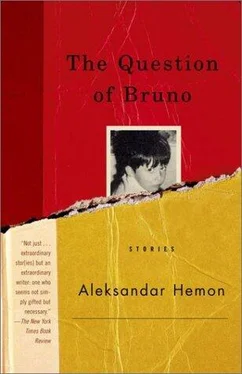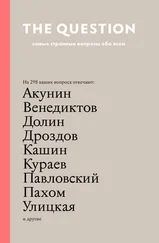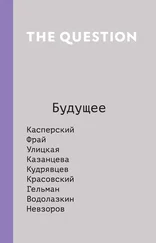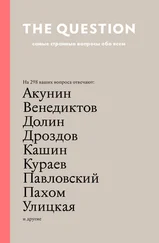Kevin is an American, from Chicago. He’s a cameraman. He’s been around, he says. He’s been in Afghanistan and Lebanon and the Persian Gulf and Africa with his camera. He’s tall, his arms are little hills of muscles. His eyes are greenish, like dried turf. He has two parallel silver earrings in his left ear. His hair is short. He’s balding and has a peninsula of grayish hair crawling down his forehead. He’s lean. When you look closely, you can see purple ruptured blood vessels where his nose meets his face. It’s from cocaine. He did it a lot in Lebanon. It was cheap and he broke down. He couldn’t stand it any longer. An Arab child shot at him with what he took to be a toy gun. There is a scar-furrow on his thigh. He was new, he broke down, he did cocaine. Now he’s fine, he says. I like him because he tells stories. All of those people do, all those reporters and cameramen and all those who have been around. But they’re all clichés, as if they watched too many movies about foreign correspondents and war reporters. Kevin’s stories are different. All those others always tell stories about other journalists. A British drunk, a German ex-Nazi, a French sissy, an American whore, are stock characters. They never tell stories about the local people, because the natives are news, they’re what’s to be reported. Kevin told me stories from Afghanistan, about lying in a high mountain ambush with bearded rebels. And about terrified Russian convoys crawling up a dire mountain road, knowing they’re being watched. About a Russian soldier being cut in pieces alive, producing unreal shrieks, until a merciful mullah shot him in the head. He filmed it, even though he knew they would take the tape away from him. Even if they didn’t, it would have never been broadcast.
She sent me a black-and-white picture: she is standing on a pile of debris in the midst of the Library ruins. I could see holes that used to be windows, and pillars like scorched matches. The camera looks at her from underneath: she is tall and erect, as if on the top of a mountain; she is in a bulletproof vest, wearing it detachedly, as though it were a bathing suit.
I’ve got this job as a liaison for the pool of foreign TV companies. Besides helping them to get by in hell, to approach and bribe government officials and find good parties, I edit footage that crews shoot in and around the city. Then I send it via satellite to London, Amsterdam, Luxembourg, or wherever. I get two — three hours of footage every day. It’s mainly blood and gore and severed limbs. I cut it into fifteen — twenty minutes, which are then transmitted to the invisible people who edit it into one — two minutes of a news story, if there is one. At the beginning, I was trying to choose the most telling images, with as much blood and bowels, stumps and child corpses as possible. I was trying to induce some compassion or understanding or pain or whatever, although the one — two minutes that I would later recognize as having been cut by me would contain only mildly horrific images. I’ve changed my view. I stopped sifting horror after I saw footage of a dead woman being carried by four men. She was prone on their arms, as if on a hearse. As they were carrying her, her head was bent backward, hanging down. Her skull was cut open by a piece of shrapnel. There was a skull-sod with hair, hanging on a patch of skin. They put her in the back of a truck, with other heaped corpses. Her head was still open. I could see the brainless bloody cavity. Then one of the men closed the cavity, putting the sod back into its place, as if putting on a lid. He did it with a certain reluctant respect, as though he was covering her naked body, as though there was something indecent in seeing the inside of somebody’s head. I cut all that out and put it on a separate tape. From then on I was cutting out everything that was as horrid. I put it all on one tape, which I hoarded underneath my pillow made of clothes. There once was that corny idiotic movie Cinema Paradiso , where the projectionist kept all the kisses from films censored by a priest. Hence I christened the tape Cinema Inferno. I haven’t watched it entirely yet. Some day I will, paying particular attention to the cuts, to see how the montage of death attractions works.
I had a dream: a woman alone on the glowing screen, and a moat in front of it, and beyond the moat is a room, window-less, full of people. She is performing me, she is acting me out. I’m in the audience, sitting in a row at the end of my gaze, on the verge of darkness. She’s not doing it right. This is not how I felt, this is not my pain. I want to get up and scream, and tell her that she’s much too involved in myself. She’s even attaining my shapes, my face, my voice. I want to help her step out of me. But I can’t do anything. She’s a light mirage. I can’t get up, because I don’t know what exactly is wrong. And then I realize — it’s the language. I’m confined within the wrong language.
Purebred dogs can be seen running in packs or, seldom, alone. You can see German shepherds, Irish setters, Belgian collies, Border collies, rottweilers, poodles, chow chows, Dobermans, cocker spaniels, malamutes, Siberian huskies, everything. After years of siege, there are, naturally, many mongrels. Some of the breeding combinations would amaze, or terrify, a canine expert. In the winter, when every living creature is in the middle of starvation, dogs are more inclined to move in packs, often attacking with common strategy, like wolves. There have been occasions when an improbable mixture of dog races attacked a child or a feeble elderly person. A German shepherd would be going for the throat, a poodle would be tearing the flesh off the calves.
It is after I write her a letter with trite reminiscing that I begin wanting to tell her all about me — I have imaginary conversations with her, making real grimaces, gesturing with real hands. I think of all the things I could’ve told her or should’ve told her: how awkward and cumbersome I feel in English, sinking in syntax, my sentences flapping helplessly, like a drowning child’s arms; about Bach’s St. Matthew’s Passion; about hoping for the arrival of spiders — the vicious cockroach-killers — into my living space; about the lack of relationship — or contact, rather — with women; about the friendless immigrant life; about the Headline News I keep watching, waiting for a glimpse of Sarajevo; about my western window, looking at corny sunsets and the distant O’Hare Airport, night airplanes landing like tired firebugs; about an involuntary memory I had about my father smashing a nest of infant mice with a shovel; about the fact that almost everything I wanted to tell her is not in the letter; about the sense of loss and the damp stamp-glue taste lingering on my tongue for hours after I drop the letter in the mailbox. I used to believe that words can convey and contain everything, but not anymore, not anymore.
I grew fond of Kevin because he never openly showed me his affection. He would just tell me stories. Even in a room full of people, I knew the stories were for me. I liked him because he was so detached. He said it was the “cameraman syndrome,” always being a gaze away from the world. We’re not in love, love is out of the question. Nobody’s in love in this godforsaken city. We just keep learning about each other. We just share stories, becoming a story along the way. And the story may end at any moment. When we make love, in the darkness — no electricity — it’s harsh and cruel, as if we were fighting, because we have to wrestle joy and flashes of love from our irked bodies. We never talk about his future departure. He has callused feet, from marching through the Afghanistan mountains.
After some grotesque obsequies, we put Aunt Fatima in my room. It soon became her room. None of us would go in there. When something was needed from her room — a scarf, a blanket, a photo — someone would say: “It’s in Fatima’s room,” which meant it was irretrievable. We kept hoping that we would be able to bury her, but a week passed and she was still there — my malodorous aunt.
Читать дальше












